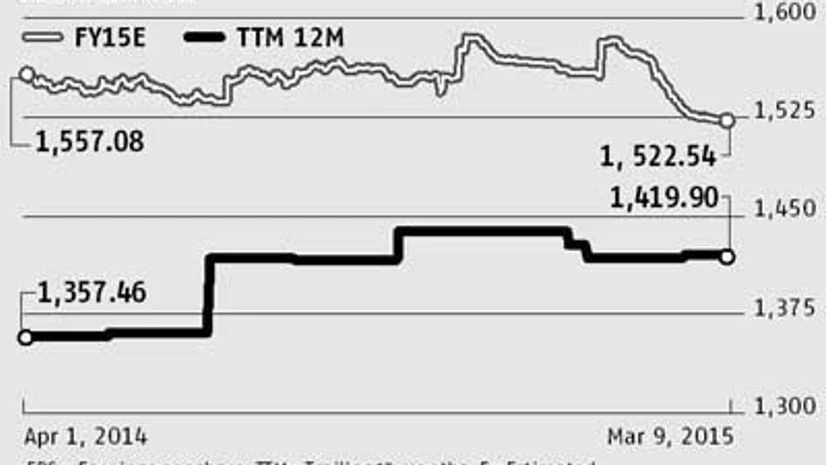The biggest drop in Indian profit forecasts since September 2013 is bottoming out, adding support to the world's second-biggest equity rally as interest rates fall and Prime Minister Narendra Modi boosts infrastructure spending.
The S&P BSE Sensex index earnings projections have edged up by 0.4 per cent since February 19, after a 2.3 per cent drop from their January 4 high, data compiled by Bloomberg show. Analysts project profits will climb 25 per cent in the next 12 months, more than three times the rate of MSCI Emerging Markets Index companies.
Equity analysts are shifting focus from a decline in earnings during the quarter ended December to the prospect of faster economic expansion after the central bank cut interest rates for the second time this year and Modi outlined plans to spend more on railways, roads and power plants. Faster growth will spur further gains in stocks after a 34 per cent jump in the Sensex over the past year sent valuations to the highest since December 2010, according to HDFC Asset Management Co.
"The profit growth outlook is going to be quite good," Prashant Jain, the chief investment officer at HDFC Asset Management, which oversees $24.4 billion as the nation's largest fund manager, said in an interview with Bloomberg TV India on March 2. "There is room for price-to-earnings multiples to move up."
Market support

Jain and India's three other biggest money managers have voiced support for the government after it proposed on February 28 a wider fiscal deficit to make room for Rs 70,000 crore ($11.2 billion) of additional spending on infrastructure in the year starting April 1. Finance Minister Arun Jaitley also promised a cut to corporate tax rates and lower levies on raw materials for local manufacturing to bolster Asia's third-largest economy.
Earnings growth will be led by the utility and capital- goods industries, analyst estimates compiled by Bloomberg show. Profits in the S&P BSE India Power Index are forecast to soar 97 per cent in the next 12 months, versus 81 per cent for the S&P BSE India Capital Goods Index. Earnings at energy companies are projected to rise less than one per cent after a 43 per cent slump in oil prices over the past 12 months.
"The budget does many things to point to higher earnings growth via rising investment spending, more productive capex, long-term reduction in taxes," Gaurav Patankar, an emerging markets portfolio manager at The Boston Company Asset Management LLC, which oversees $50 billion, said by e-mail on March 1. "Investors should be pretty satisfied on that count."
Expensive valuations
Indian shares may retreat because valuations have climbed too high, according to Kotak Institutional Equities. At 20.3 times reported earnings, the Sensex is twice as expensive as the MSCI BRIC Index of the four-largest emerging markets. The Sensex declined 0.5 per cent to 28,709.87 at the close in Mumbai on Tuesday.
The latest results from Indian companies show profits were still declining as of December. Earnings per share for Sensex companies declined 2.5 per cent in the December quarter, the first drop since the three months through June 2013, according to data compiled by Bloomberg.
"Valuations are just not looking good," Sanjeev Prasad, the Singapore-based co-head and senior executive director at Kotak Institutional, said in an interview with Bloomberg TV India on Monday. The Sensex may drop as much as 5 per cent as the positive macroeconomic indicators are "still not translating into investments and earnings numbers," he said.
The prospect of accelerating economic growth is luring new investors to Indian stocks, including UniSuper Management Pty, an Australian pension fund that manages more than A$50 billion ($39 billion). The fund is considering investing as much as A$200 million through a money manager or exchange-traded funds, Chief Investment Officer John Pearce said in an interview in Sydney.
India's economy is projected to expand as much as 8.5 per cent in the next fiscal year, according to the latest Finance Ministry estimates. The Reserve Bank of India is seeking to keep the inflation rate in a band between two per cent and six per cent, with a target of four per cent. It was 5.11 per cent in January.
"The Indian market is undervalued if it is going to achieve seven per cent to eight per cent growth with low inflation," Adrian Mowat, the chief Asian and emerging market equity strategist at JPMorgan Chase & Co in Hong Kong, said in an interview on March 2. "We are very upbeat about earnings growth."

)
